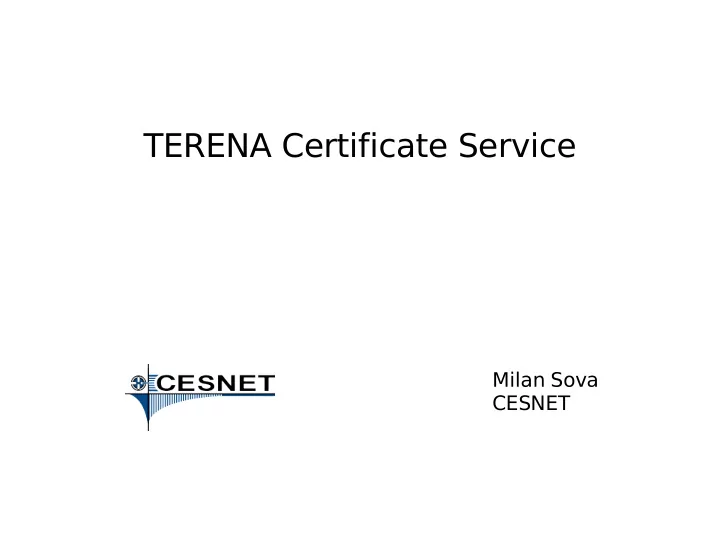

TERENA Certificate Service Milan Sova CESNET
Agenda ● History ● TCS Structure ● Procedures ● Conclusions
History “pop-up free server certificates”
History: SCS ● TERENA Server Certificate Service – summer 2004: first idea – Dec 2004: SCS project started – Sep 2005: Call for Proposals – Jan 2006: Contract with GlobalSign (1 year) ● 8 NRENs – March 16 2006: service operational – Jan 2007: Contract prolonged (3 years)
History: SCS -> TCS ● Sep 2008: new Call for Proposals ● Apr 2009: Contract with Comodo CA Ltd. – server, personal, object signing certificates => TCS (TERENA Certificate Service) ● Jul 2009: TERENA SSL CA operational ● Feb 2009: TERENA eScience Personal CA accredited by EUGridPMA, operational ● Feb 2009: TERENA Personal CA operational
TCS “PKI that works”
TCS Characteristics ● 22 NRENs ● flat fee – unlimited number of certificates ● 5 CAs operated by Comodo – including CRL, OCSP – access via HTTP API – implicitly trusted by major OSs and software ● RA roles and issuance managed by NRENs – except for object signing
Legal Structure ● Contract TERENA – Comodo ● Contracts TERENA – NRENs ● Contracts NREN – member organizations – all referring CPS ● 3 CPs – Server & Object Signing ● including eScience Server – Personal – eScience Personal
TCS CAs ● TERENA SSL CA ● TERENA eScience SSL CA ● TERENA Personal CA* ● TERENA eScience Personal CA* ● TERENA Code Signing CA* * optional (surcharge)
TCS Certificate Chain (AddTrust External CA Root) UTN-USERFirst-Hardware UTN-USERFirst-Object UTN-USERFirst-Client Authentication and Email TCS TCS TCS TCS TCS SSL eScience SSL eScience Personal Personal Object Signing End Entity End Entity End Entity End Entity End Entity End Entity End Entity End Entity End Entity End Entity
Procedures “solid and usable”
Procedures: Server ● NREN – web portal – register of organizations ● administrators ● DNS zones
Procedures: Server ● server admin requests a certificate – DNS names ● checked by the portal against the register – public key (PKCS#10) ● organization admin – checks DNS – requester relation – approves
Procedures: Personal ● “self-service” certificate issuance ● federated portal – front-end to TCS CA ● organizations – Identity Providers – identity checked using official ID – account management – attributes release
Attributes ● eduPersonEntitlement – authorization & eligibility ● uniqueID – traceability, naming conflicts ● commonName ● email
Conclusions ● cost-effective ● implicitly trusted by common software ● SSL server authentication ● S/MIME, user authentication ● grid user authentication – grid SSL server accreditation pending ● easy to use
Recommend
More recommend